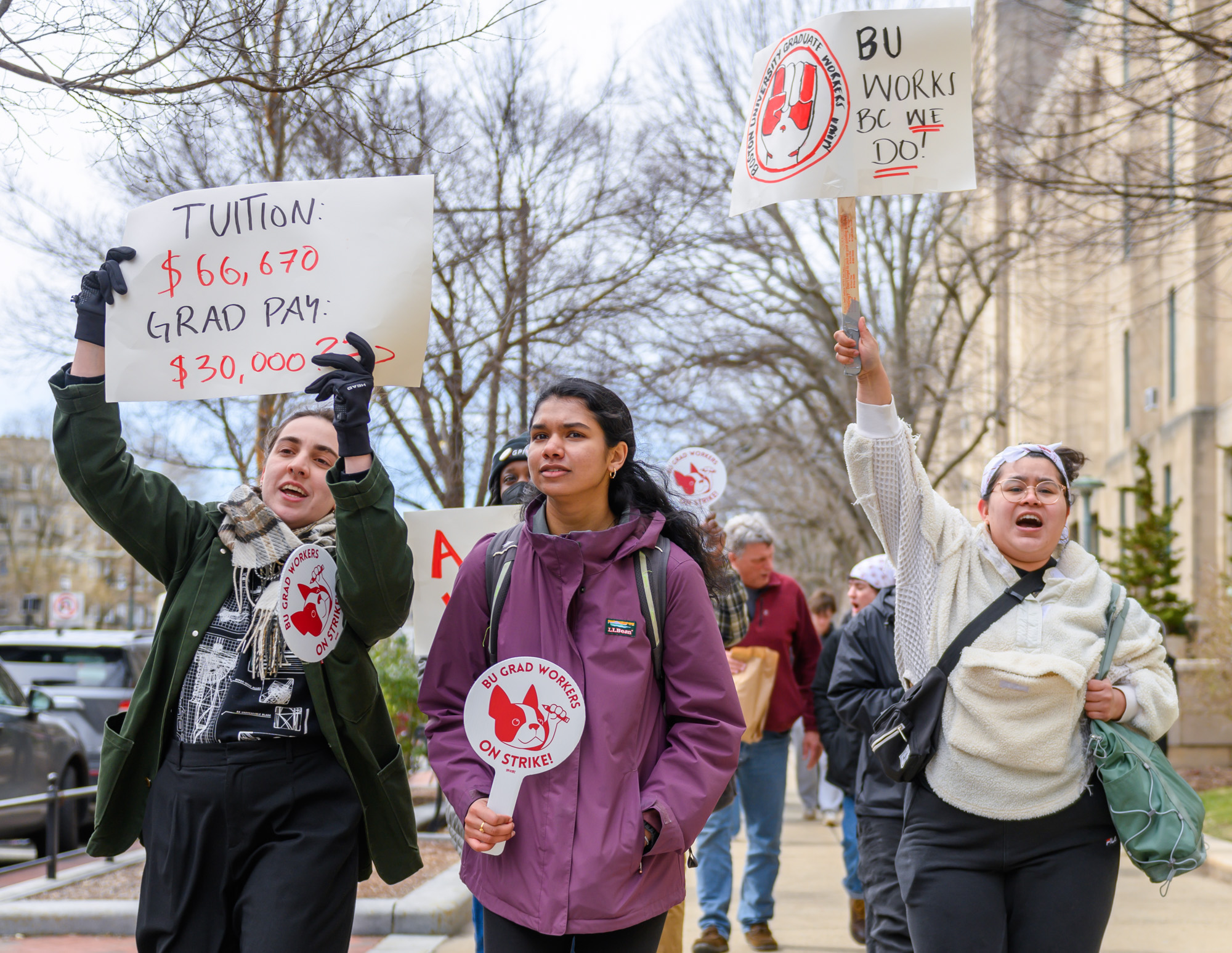Students, administrators and union members at Boston University face uncertainty about union contracts and academics as the semester comes to an end.

The BU Graduate Workers Union strike began on March 25 after months of failed contract negotiations between the union and BU administration. The union — which consists of graduate teaching assistants, graduate teaching fellows and research assistants — went on strike for increased wages and benefits, childcare funding for working families, a more manageable workload and more.
On April 23, BUGWU posted on Instagram that SEIU Local 509, the labor union that represents it, filed two Unfair Labor Practice charges against BU.
“On March 26th and April 5th, SEIU Local 509 filed separate Unfair Labor Practice (ULP) charges against Boston University (BU) for their efforts to break the Boston University Graduate Workers Union (BUGWU) strike,” the post stated.
SEIU filed charges over BU’s “reckless strikebreaking efforts” and lists three main unfair labor practices. The union alleges harassment and surveillance of workers engaged in protected activity, implementation of the administration’s self-attestation policy — which forces striking workers to declare themselves on strike — and intimidation to adhere to the policy.
The post also cites multiple instances of wrongdoing, including one where an associate dean of the College of Arts and Sciences allegedly “chased workers peacefully flyering in the BU Center for Computing & Data Sciences.”
Maggie Boyd, a student pursuing a doctorate in the English department and a BUGWU member, said it is “important that we continue fighting for a better university.”
“If we have better conditions to do work in, we’ll be better workers. We’ll be better educators,” Boyd said.
Earlier this month, the Office of the Provost stated it would start holding weekly bargaining meetings with BUGWU. The university and the union are still in contract negotiation as of April 25, according to BU spokesperson Colin Riley.
Administration is working “to resolve the remaining articles under discussion at the bargaining sessions” between the university and the union, Riley said.
“The University is hoping to hear back on its compensation and benefits offers in order to come to an agreement on a first contract,” Riley said.
Of the 3,500 workers in the union, not all of them are on strike.
Students have been affected by the absence of some graduate workers. Some classes have canceled discussion sections, rescheduled exams and delayed grading of assignments.
Grace Doulé, a junior in the College of Communication, said that she feels she is missing out since her weekly discussion no longer meets due to the strike.
“Being able to discuss the readings and the content from the lecture definitely made the content more approachable and more understandable, whereas now we don’t really have that,” Doulé said
Doulé said she prefers taking classes with TAs because they provide “extra support” during the course.
“They are a more approachable figure in the class sometimes to ask questions to, and they always provide a lot of guidance and have good feedback,” Doulé said.
University Provost Kenneth Lutchen wrote in an email on April 19 that “the majority of classes have not been affected” because the majority of graduate workers are not on strike.
Riley also said that the strike is affecting students differently.
“The impact is a little uneven,” Riley said. “Some people have not had that impact.”
Some graduate workers are not leading labs and discussion sections or helping professors grade, and students remain uncertain about semester grades and the quality of their education.
Riley confirmed that even if a class, discussion or lab section is not meeting because of the strike, students will not have to retake it as long as they have completed the course.
It is unknown whether the university will make permanent changes to the course curriculum if BUGWU continues to strike in the fall.
Angela Cedeño, a junior in the Questrom School of Business, said that even though she’s not relying on help from her TAs this semester, she feels her peers are missing the “support factor” that graduate workers provide.
“[The strike is] not really affecting me as much because I am performing well in the class, but I just feel sympathetic for the people that do need that help,” Cedeño said.
As final exam season approaches, Doulé is experiencing the full impact of the strike firsthand.
“I’ve really been feeling the effects of not having [TAs] around,” Doulé said.























































































































